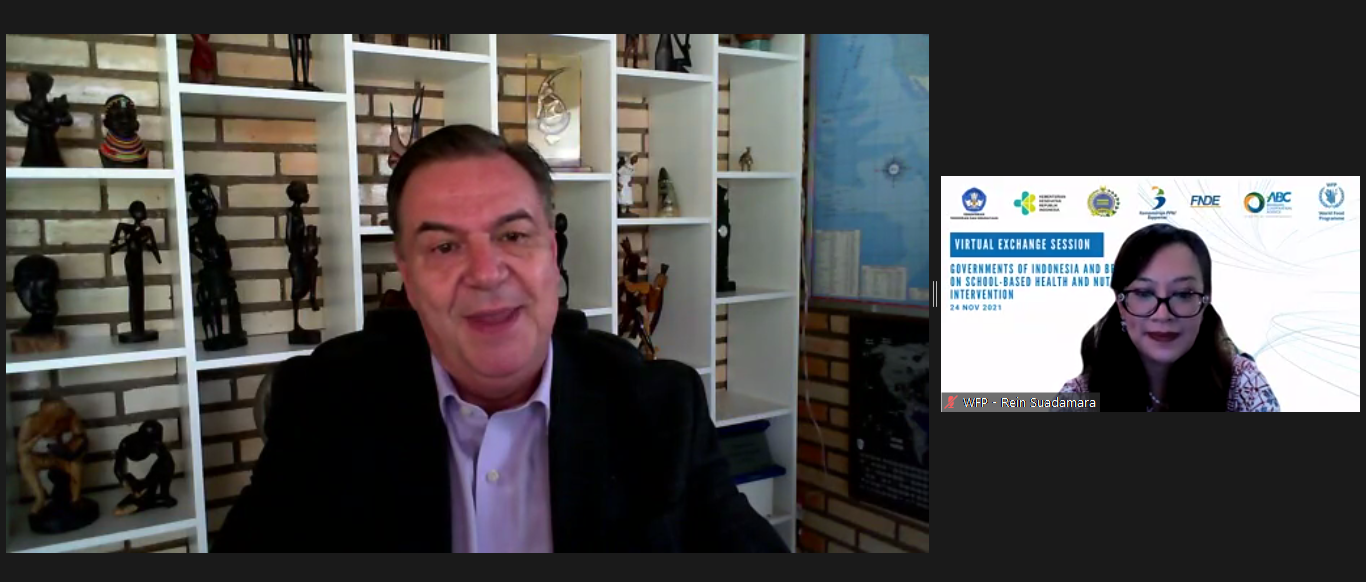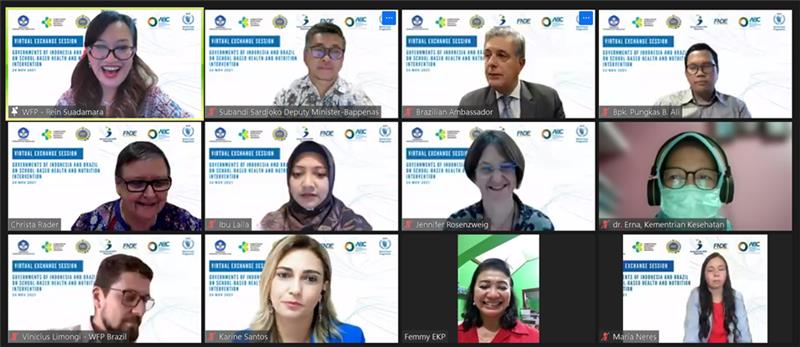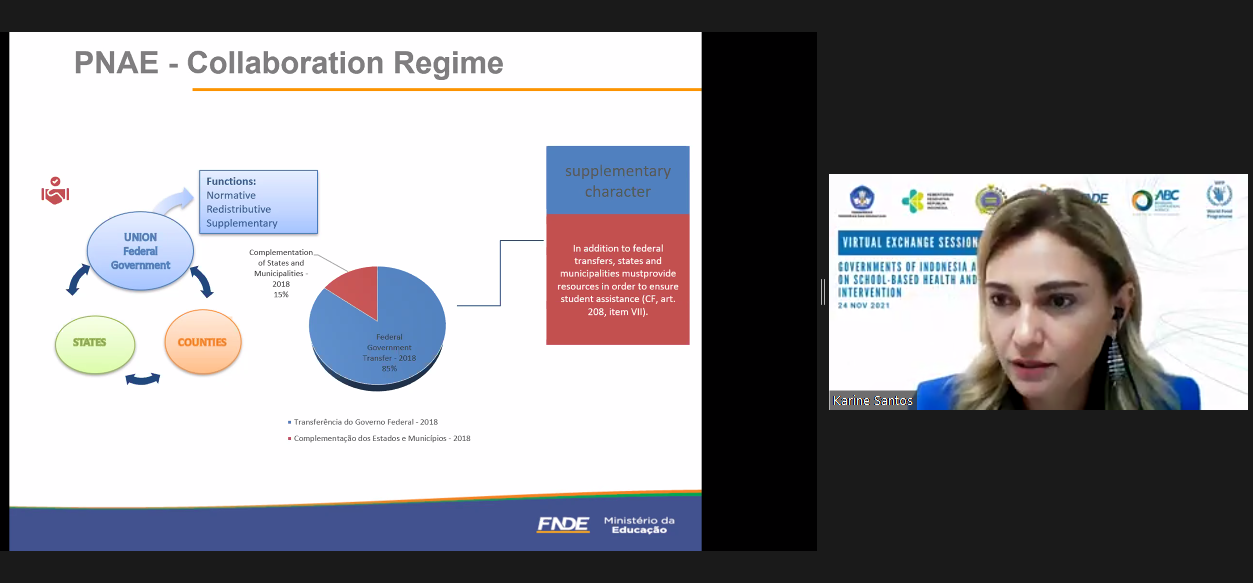
The governments of Brazil and Indonesia have taken part in the final session of a Virtual Exchanges series organized by WFP Indonesia and the WFP Centre of Excellence against Hunger Brazil, with support from the Brazilian Cooperation Agency (ABC) and the National Fund for Education Development (FNDE), on school-based health and nutrition. The aim of the series is to allow both countries to share knowledge and experiences in those areas to support the efforts to reposition school-based health and nutrition programmes in a post-COVID-19 scenario. The event brought together representatives from both governments, in addition to experts from the WFP country office and the Centre of Excellence in Brazil.
“The socio-economic impacts of the pandemic threaten to cause setbacks in the global developmental gains of the recent decades and many of the advancements made possible by South-South and Triangular Cooperation are now at risk. So, rapid adaptation and the implementation of new methodologies are even more important in this context and remote assistance has the power to use digital information and reduce costs, supporting new ways to overcome the pandemic physical limitations and to create a stable and cost-effective environment for post-crisis planning”, said Daniel Balaban, Director of the WFP Centre of Excellence against Hunger Brazil, during his opening remarks.
Christa Räder, WFP Representative in Indonesia, mentioned that, in the pandemic context, the poorest children living in remote areas are at the higher risk of being left behind. “Covid-19 has pushed us to reflect on how to prepare and respond to such a prolonged disaster and potential lifelong impact on children’s health and education”, she said.
The opening panel was also composed by Dr. Ir. Subandi, Deputy Minister for Human Development, Community and Culture in the Indonesian Ministry of Development Planning Agency, who explained the country’s five-year development plan. “The plan states the importance of human development as it has a great deal of impact in people’s quality of life and social economic wellbeing. This agenda is a top priority, as human capital is the pre-requisite of promoting growth”, he said.
Representing the Brazilian government was José Amir da Costa Dornelles, Ambassador of Brazil in Indonesia, who highlighted some of the main characteristics of the Brazilian school feeding programme and how it has helped to fight malnutrition and improve health of Brazilian school children. “The Brazilian programme has been quite successful based on two fundamental rights: the right to education and to proper nutrition”, he said.

The Indonesian School-Based Health and Nutrition intervention
Prior to the COVID-19 pandemic, Indonesia was already facing a triple burden of malnutrition and other issues among school-aged children between five and 12 years old and adolescents. The “Fill the Nutrient Gap” analysis recently completed by WFP found that 13% of the population cannot afford a diet that meets their nutrient requirements, and in certain provinces it is as high as 40% to 54%. Other studies also showed that, during the COVID-19 pandemic, families struggled to meet basic needs, which had an important impact on food security. In addition to that, school closures affected over 60 million students.
To discuss these topics, representatives from the Indonesians ministries of Development Planning, Health and Education delivered presentations on Policy Direction for Nutrition Improvement of School-Aged Children; School Health Efforts (UKS) as platform for Health and Nutrition Programme Intervention; and School Reopening and Face-to-Face learning (policy, strategy, implementation, and challenges).
Pungkas Bahjuri, Director of Health and Community Nutrition at the Ministry of National Development Planning of the Republic of Indonesia, detailed the fundamental aspects of the Indonesian school-based programmes: healthy school food environment, health services and health education, including physical activities and increasing nutritious behaviour among young children. After that, Erna Mulati, Director for Family Health in the Indonesian Ministry of Health, detailed actions currently in place to help promote healthy habits in schools, including health education and a “Student Health Champions” programme. To close the presentation on the Indonesian strategies, Ibu Laila, representative from the Ministry of Education, Culture, Research and Technology, presented the country’s policies for the safe reopening of schools, which is taking place regionally, observing current restrictions due to the pandemic.
The Brazilian School Feeding Programme
The Brazilian National School Feeding Programme (PNAE), which serves more than 40 million students across the country, has been an inspiration to several countries around the world, through South-South Cooperation promoted by the WFP Centre of Excellence in partnership with the government, through the Brazilian Cooperation Agency. During the section on Brazil, Karine Santos, General Coordinator of PNAE, and Sineide Neres, nutritionist and advisor at the General Coordination of PNAE, detailed the main characteristics of the programme and the actions taken to mitigate the effects of the pandemic.
Karine Santos explained the legal framework that supports the school feeding policy, which is based on the basic right to education and to adequate and healthy food. She also detailed the programme’s costs, the legal requirements for purchasing food and the basic documents used for its management, such as the Food Guides for the Brazilian population. “The Food Guides show that we must offer more fresh and minimally processed foods and less processed and ultra-processed foods. Promoting the purchases from smallholder farmers has been essential in our ability to provide this type of high-quality foods”, said Karine Santos.

Sineide Neres highlighted the many challenges involved in the implementation of such a large and comprehensive programme, especially considering schools closing and reopening adaptations. “The PNAE legislation and guidelines are always being adapted and improved. This is necessary to represent all the different food cultures and socioeconomic realities in our country, so we can address the multiple impacts of malnutrition and mitigate the effects of an unprecedented crisis like the pandemic”, she said.
The presentation was followed by a questions and answers session, where governments from Indonesia and Brazil exchanged views on policies to improve children’s nutrition and approaches used to adapt to the COVID-19 impacts on school-based services, including funding sources, vaccine regulations and community participation in the programme.
To close the event, Jennifer Rosenzweig, WFP Indonesia’s Deputy Country Director, and H. Teuku Faizasyah, Director General for Information and Public Diplomacy at the Ministry of Foreign Affairs of the Republic of Indonesia, reviewed the main takeaways from the exchange and stressed the interest and commitment to continuous collaboration with Brazil to improve the health and nutrition for school-aged children. “Empowering young people and enabling them to actively participate in building their future requires concerted, cooperative and integrated efforts. It is our belief that international cooperation is now needed more than ever to build resiliency in these challenging times”, concluded Dr. Faizasyah.




